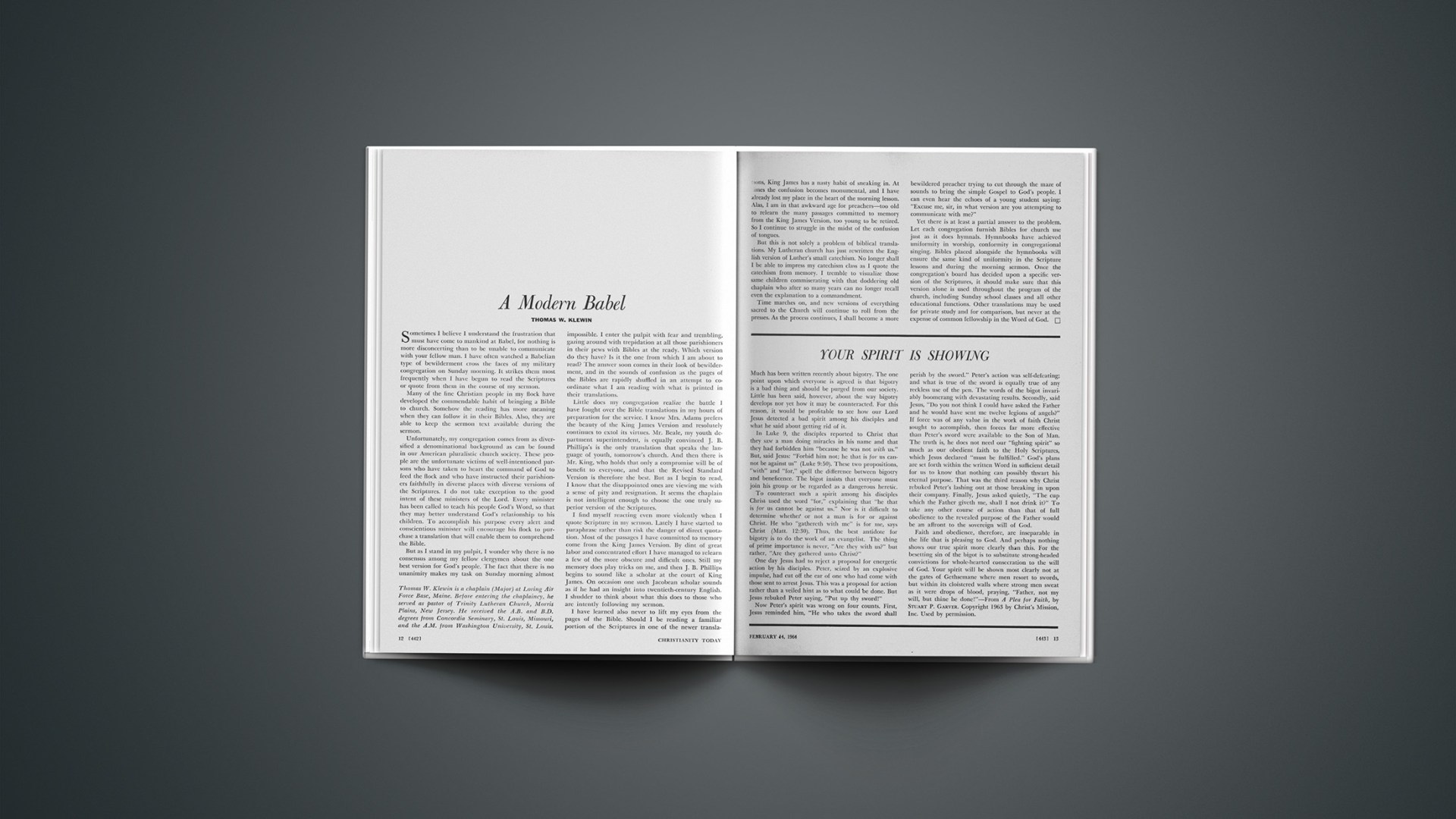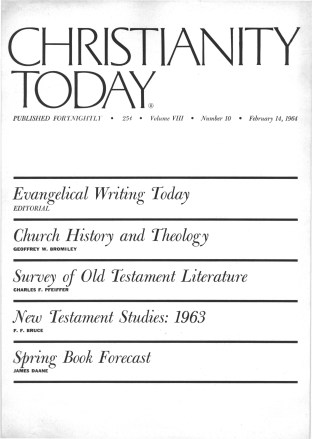Sometimes I believe I understand the frustration that must have come to mankind at Babel, for nothing is more disconcerting than to be unable to communicate with your fellow man. I have often watched a Babelian type of bewilderment cross the faces of my military congregation on Sunday morning. It strikes them most frequently when I have begun to read the Scriptures or quote from them in the course of my sermon.
Many of the fine Christian people in my flock have developed the commendable habit of bringing a Bible to church. Somehow the reading has more meaning when they can follow it in their Bibles. Also, they are able to keep the sermon text available during the sermon.
Unfortunately, my congregation comes from as diversified a denominational background as can be found in our American pluralistic church society. These people are the unfortunate victims of well-intentioned parsons who have taken to heart the command of God to feed the flock and who have instructed their parishioners faithfully in diverse places with diverse versions of the Scriptures. I do not take exception to the good intent of these ministers of the Lord. Every minister has been called to teach his people God’s Word, so that they may better understand God’s relationship to his children. To accomplish his purpose every alert and conscientious minister will encourage his flock to purchase a translation that will enable them to comprehend the Bible.
But as I stand in my pulpit, I wonder why there is no consensus among my fellow clergymen about the one best version for God’s people. The fact that there is no unanimity makes my task on Sunday morning almost impossible. I enter the pulpit with fear and trembling, gazing around with trepidation at all those parishioners in their pews with Bibles at the ready. Which version do they have? Is it the one from which I am about to read? The answer soon comes in their look of bewilderment, and in the sounds of confusion as the pages of the Bibles are rapidly shuffled in an attempt to coordinate what I am reading with what is printed in their translations.
Little does my congregation realize the battle I have fought over the Bible translations in my hours of preparation for the service. I know Mrs. Adams prefers the beauty of the King James Version and resolutely continues to extol its virtues. Mr. Beale, my youth department superintendent, is equally convinced J. B. Phillips’s is the only translation that speaks the language of youth, tomorrow’s church. And then there is Mr. King, who holds that only a compromise will be of benefit to everyone, and that the Revised Standard Version is therefore the best. But as I begin to read, I know that the disappointed ones are viewing me with a sense of pity and resignation. It seems the chaplain is not intelligent enough to choose the one truly superior version of the Scriptures.
I find myself reacting even more violently when I quote Scripture in my sermon. Lately I have started to paraphrase rather than risk the danger of direct quotation. Most of the passages I have committed to memory come from the King James Version. By dint of great labor and concentrated effort I have managed to relearn a few of the more obscure and difficult ones. Still my memory does play tricks on me, and then J. B. Phillips begins to sound like a scholar at the court of King James. On occasion one such Jacobean scholar sounds as if he had an insight into twentieth-century English. I shudder to think about what this does to those who are intently following my sermon.
I have learned also never to lift my eyes from the pages of the Bible. Should I be reading a familiar portion of the Scriptures in one of the newer translations, King James has a nasty habit of sneaking in. At times the confusion becomes monumental, and I have already lost my place in the heart of the morning lesson. Alas, I am in that awkward age for preachers—too old to relearn the many passages committed to memory from the King James Version, too young to be retired. So I continue to struggle in the midst of the confusion of tongues.
But this is not solely a problem of biblical translations. My Lutheran church has just rewritten the English version of Luther’s small catechism. No longer shall I be able to impress my catechism class as I quote the catechism from memory. I tremble to visualize those same children commiserating with that doddering old chaplain who after so many years can no longer recall even the explanation to a commandment.
Time marches on, and new versions of everything sacred to the Church will continue to roll from the presses. As the process continues, I shall become a more bewildered preacher trying to cut through the maze of sounds to bring the simple Gospel to God’s people. I can even hear the echoes of a young student saying: “Excuse me, sir, in what version are you attempting to communicate with me?”
Yet there is at least a partial answer to the problem. Let each congregation furnish Bibles for church use just as it does hymnals. Hymnbooks have achieved uniformity in worship, conformity in congregational singing. Bibles placed alongside the hymnbooks will ensure the same kind of uniformity in the Scripture lessons and during the morning sermon. Once the congregation’s board has decided upon a specific version of the Scriptures, it should make sure that this version alone is used throughout the program of the church, including Sunday school classes and all other educational functions. Other translations may be used for private study and for comparison, but never at the expense of common fellowship in the Word of God.
Your Spirit Is Showing
Much has been written recently about bigotry. The one point upon which everyone is agreed is that bigotry is a bad thing and should be purged from our society. Little has been said, however, about the way bigotry develops nor yet how it may be counteracted. For this reason, it would be profitable to see how our Lord Jesus detected a bad spirit among his disciples and what he said about getting rid of it.
In Luke 9, the disciples reported to Christ that they saw a man doing miracles in his name and that they had forbidden him “because he was not with us.” But, said Jesus: “Forbid him not; he that is for us cannot be against us” (Luke 9:50). These two propositions, “with” and “for,” spell the difference between bigotry and beneficence. The bigot insists that everyone must join his group or be regarded as a dangerous heretic.
To counteract such a spirit among his disciples Christ used the word “for,” explaining that “he that is for us cannot be against us.” Nor is it difficult to determine whether or not a man is for or against Christ. He who “gathereth with me” is for me, says Christ (Matt. 12:30). Thus, the best antidote for bigotry is to do the work of an evangelist. The thing of prime importance is never, “Are they with us?” but rather, “Are they gathered unto Christ?”
One day Jesus had to reject a proposal for energetic action by his disciples. Peter, seized by an explosive impulse, had cut off the ear of one who had come with those sent to arrest Jesus. This was a proposal for action rather than a veiled hint as to what could be done. But Jesus rebuked Peter saying, “Put up thy sword!”
Now Peter’s spirit was wrong on four counts. First, Jesus reminded him, “He who takes the sword shall perish by the sword.” Peter’s action was self-defeating; and what is true of the sword is equally true of any reckless use of the pen. The words of the bigot invariably boomerang with devastating results. Secondly, said Jesus, “Do you not think I could have asked the Father and he would have sent me twelve legions of angels?” If force was of any value in the work of faith Christ sought to accomplish, then forces far more effective than Peter’s sword were available to the Son of Man. The truth is, he does not need our “fighting spirit” so much as our obedient faith to the Holy Scriptures, which Jesus declared “must be fulfilled.” God’s plans are set forth within the written Word in sufficient detail for us to know that nothing can possibly thwart his eternal purpose. That was the third reason why Christ rebuked Peter’s lashing out at those breaking in upon their company. Finally, Jesus asked quietly, “The cup which the Father giveth me, shall I not drink it?” To take any other course of action than that of full obedience to the revealed purpose of the Father would be an affront to the sovereign will of God.
Faith and obedience, therefore, are inseparable in the life that is pleasing to God. And perhaps nothing shows our true spirit more clearly than this. For the besetting sin of the bigot is to substitute strong-headed convictions for whole-hearted consecration to the will of God. Your spirit will be shown most clearly not at the gates of Gethsemane where men resort to swords, but within its cloistered walls where strong men sweat as it were drops of blood, praying, “Father, not my will, but thine be done!”—From A Plea for Faith, by STUART P. GARVER. Copyright 1963 by Christ’s Mission, Inc. Used by permission.
Thomas W. Klewin is a chaplain (Major) at Loring Air Force Base, Maine. Before entering the chaplaincy, he served as pastor of Trinity Lutheran Church, Morris Plains, New Jersey. He received the A.B. and B.D. degrees from Concordia Seminary, St. Louis, Missouri, and the A.M. from Washington University, St. Louis.










